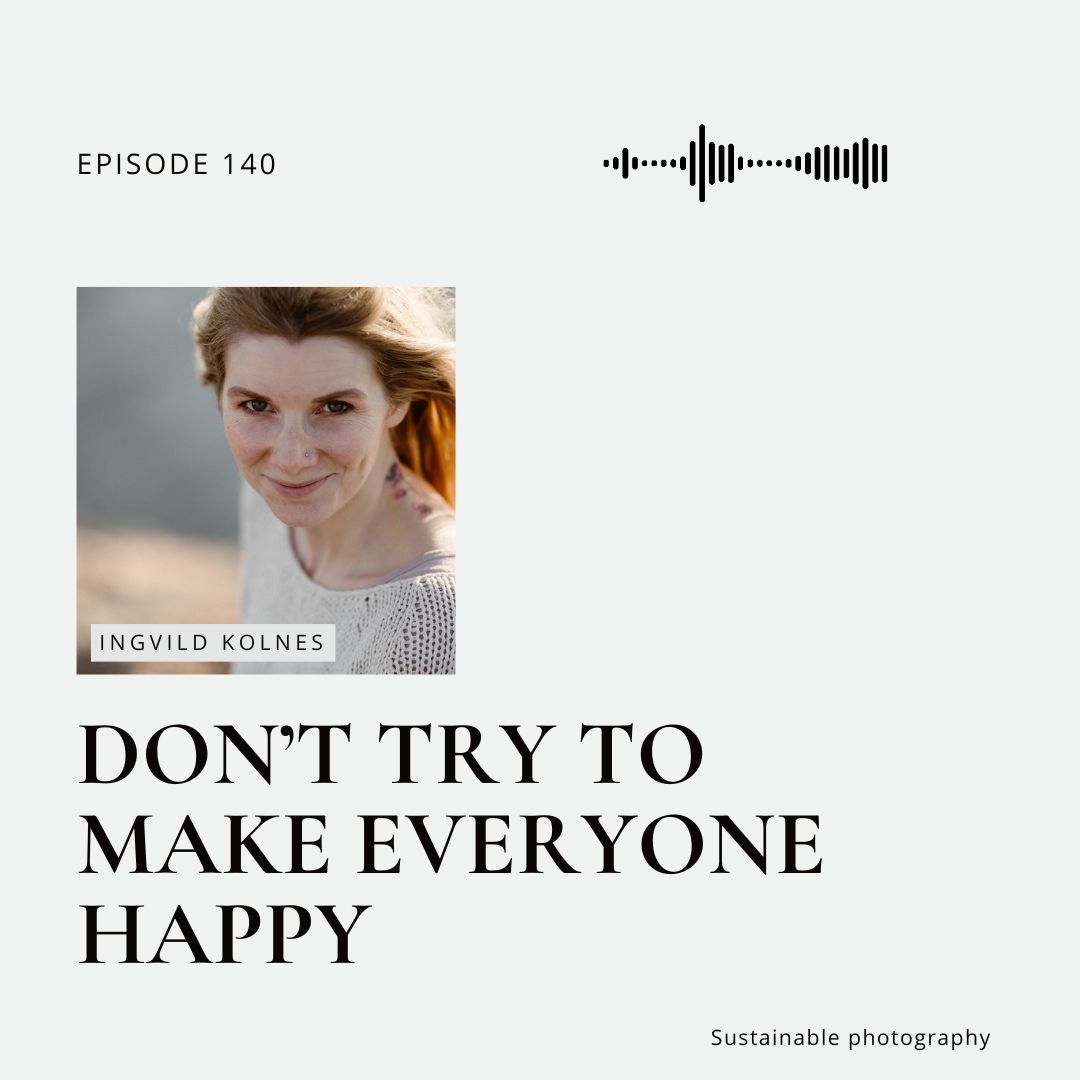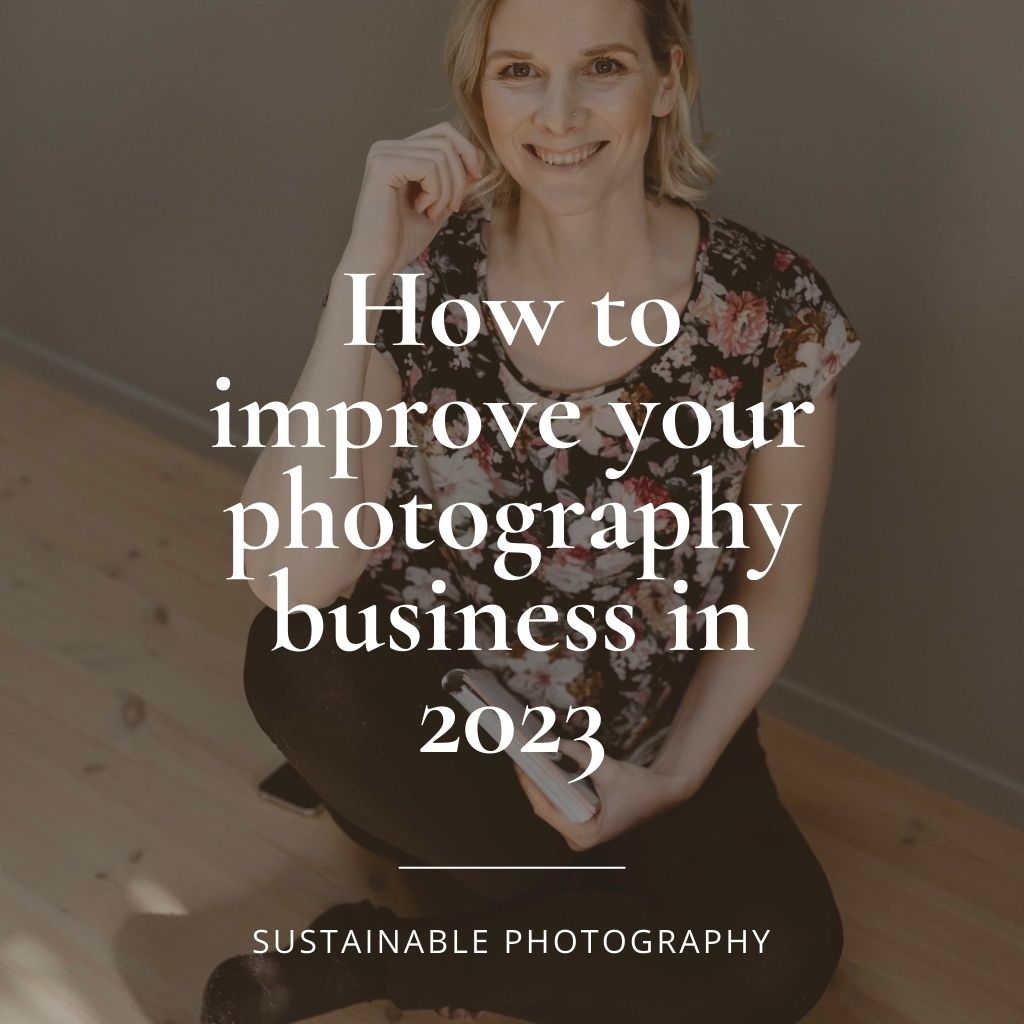Episode Transcript
[00:00:01] Hi, and welcome back to another episode of sustainable photography. I'm Ingall Kalnas and I think this is episode 142.
[00:00:11] I want to talk about coaching and mentoring today and how this is, first of all, how this is different, the difference between coaching and mentoring, and also how it can really help you and how you might grow if you have a mentor or a coach. And I know that a lot of people talk about coaching when they really mean mentoring and vice versa. So I wanted to start with really the distinguishment between the two.
[00:00:40] First of all, I consider myself a mentor. I work with my clients in a very personal way. We work long term, usually, and in my mentor program there's a lot of guidance and advice, and I give my students support while I'm using my own experiences as a background.
[00:01:06] I talk about how I've done my business and how I've handled different situations, and my focus is on giving a lot of tangible advice and giving structures and strategies. Coaching, on the other hand, is a bit different. Right now I'm studying coaching and I want to implement more coaching in what I do as well. Coaching is more asking questions to help the person you're working with finding the solutions themselves.
[00:01:42] And it can be a lot more powerful in many ways because you have to work it out yourself and you have to kind of get there on your own while having the support and guidance.
[00:01:56] I hope that a mix of the two is going to be really, really powerful and really great. But I do want you to know that there is a difference, and you might be looking for one or the other to help you where you want to be in your life and in your business.
[00:02:14] Sometimes you might feel like you're at a place where you can't really grow anymore, where you're maybe seeing too many limitations and focus, focusing too much on what isn't working. That could be a place where having someone by your side can really help you to see new opportunities, to handle challenges and to see and figure out what else there could be ahead of you.
[00:02:42] Maybe you're struggling with pricing, maybe you're struggling to manage your clients. I mean, as a photographer, there are so many things you might have get stuck on, and a mentor can be by your side and help you to reframe these things as opportunities instead of obstacles. And I completely get the need to be upset when something isn't going your way. I definitely am one of those people who just needs to just get it out and get some sympathy. But as a mentor or a coach or whatever you want to call it, I tend to be focused on finding solutions. And that is something that I probably can work at getting better, at just giving space to just feel all the feelings before starting to come up with solutions. But it is important to get to that place at some point where you're ready to see. Okay, so what can I learn from this? How can I make it better next time so that it can go my way? When you're stuck doing everything on your own, it can be such a big challenge because you're not really seeing how you can use the things that aren't going your way as a benefit, as something that is actually a good thing. Whether that is you being exhausted from working too much or you're not booking the thing that you thought you might, or a client isn't paying what you thought they would for a service.
[00:04:10] That's definitely how I work with my coaches to really find out. Okay, so this didn't go as we thought. Why not? And what can we do differently next time? If you try to handle all these things on your own, you're really gonna miss out on a lot of potential.
[00:04:28] We're not supposed to do these things on our own. It's just way too hard. And of course, I know that investing in a coach or a mentor, whether that's me or someone else, it can feel a bit daunting because it can be a lot of money. But I want you to look at the long term effects and not just the here and now. Yes, it can be of great benefit immediately, but it is the long term effect that is the most powerful. It is what you need to put the most focus on to see if it's worth it or not for you. I've actually created a lifetime calculator, so if you sign up for a discovery call with me, then we can take a look to see. Okay, so what will it take for you to actually make this worth it? Because it can be really helpful to see that your investment will pay off. And also, when you're spending money on something like education, on something like mentoring, coaching, you will work harder to make sure that it's worth it. There is something in your brain that's gonna start associating value with you taking action, which means it's more likely for you to do more. The psychological commitment will lead to a much greater accountability and will help you to see bigger outcomes in your business.
[00:05:52] And accountability, that is a huge part of being mentored or coach. When someone is listening to what you set as your goals and kind of holding you to them, you're so much more likely to follow through. And at least the way I work, we go through your goals and make sure that you know and I know what you want to work towards so that you're so much more likely to get there. Because if you don't know what you're working towards, then how will you know which steps to take? How will you know when you actually get to the place where you want it to be? When you're working with a coach or a mentor, you might start out setting some goals. You might decide what you want to focus on, whether that is improve your revenue, getting more clients, having more free time, having more control over the finances in your business, whatever it is. Hopefully you've sat down and decided this along with your coach or your mentor. And then you know what you're going to focus on. And paying attention to this and seeing how it goes is really important. And also keeping in mind down the road what you set out to do. Because if you set out to increase your revenue, which has led to you increasing your prices, and then you're disappointed that you're getting fewer inquiries, that might mean that you're getting a little bit off track because you didn't set out to get more inquiries, you set out to increase your revenue. And if that is what you're accomplishing, then good job because you probably can't do all the things. You probably can't both get more inquiries and free up your time and make more money and increase your prices. You probably have to choose some goals and some kind of guiding stars that you're going towards and try to really be happy for yourself. And also, sometimes it takes a long time, sometimes you're doing the changes and it's going to take some time before it kicks in. And that's why mentoring and coaching is really a long term thing. And speaking of long term things, when you are in a long term coaching or mentorship, it can actually change how your brain is wired because there's this thing called neuroplasticity where your brain creates new pathways as you create new habits. Maybe that means that you have improved your workflow or changed your business strategy, or maybe you created new habits with how you treat money. That's going to stick with you and continue to benefit your business long after your mentorship has ended.
[00:08:43] Okay, so I've spoken a little bit about how coaching and mentoring can be different and some different things that you might accomplish when working with a mentor. But I do want to speak a little bit about how you can be coachable as well, because that is a thing. You could have the best coach or mentor out there. But if you're not engaging with the advice you're getting, if you're not taking responsibility yourself, then you might not really get anywhere.
[00:09:16] So let's talk a little bit about what you might need to do to be able to get the most out of your coaching or mentoring experience.
[00:09:27] You have to take responsibility for the path that you're on. So a coach or a mentor, they can give you all the insights and the advice and the support, but it's up to you to apply these things. No one can really come in and make the changes for you. And that might mean that you have to change up your business model, do something new with your marketing strategy, change the focus of your long term strategy and vision. But it's up to you to decide what you want to focus on and it's up to you to make these changes.
[00:10:02] You also have to be clear as to what it is you need. If you're struggling with something within your photography business, whether you're struggling with pricing or you have an issue with a client, you have to bring it up because no one can really read your mind. And if you are being clear as to what you're struggling with and what you need, you can get the advice and the support to help you out where you're at.
[00:10:32] And I know that that can be a challenge, but really that is what you're there for. So make sure you take advantage of the help that you can get. One thing that I know can be a big struggle is to be open to feedback, especially when the feedback could be challenging you.
[00:10:52] Maybe you're told that your pricing structure isn't sustainable. Maybe you're told that your website could be working against you. Maybe you need to up your blogging game. And I know that, first of all, it's not really nice to feel that you're being criticized. And hopefully that isn't how it's coming across.
[00:11:15] But if you can take that advice as advice, as something that can help you out, then really see it as that, as a potential to. Okay, I see that I'm really missing out here.
[00:11:30] Let me see if I can get on that. And if it's something that you're struggling doing on your own, maybe you can get some help with that. Maybe you can outsource it or get a va. Because if someone's seeing opportunities that you're missing out on, I hope that you see that it's in your best interest that you address that and do something about it. In my mentor program we have group meetings a couple of times a month and sometimes I do one on one sessions as well. And being there for those sessions, that's like being there for half of it. The other half is to do something about what we just talked about, to think about it, figure out what are my next steps going to be and then put it into practice.
[00:12:19] At least for me. I know that that is probably the hardest part of it because I want to do it and then I get a little bit stuck. And if that's you as well, don't be afraid to bring that up to your coach or your mentor and say, I hear you. I know that I'm supposed to do something, but I'm struggling to actually get it done. Maybe that's where you can use your next one on one session or your next slot in the group call to address.
[00:12:47] We all are so different and we need different stuff. So you have to take responsibility for you and let your coach or mentor know what you need.
[00:12:57] You also need to know that transformations take time.
[00:13:03] When you are building up your sustainable photography business, it's not going to happen overnight. You're going to need to stay committed. You're going to need to keep an eye on your goals and do the work that you know you need to do to get there.
[00:13:19] But I also want you to track your progress. I bet if you look back a year, two years, three years, you'll see that you've come such a long way. And sometimes this can be kind of difficult to pick up on. But some things that can help is to keep a document where you save all of your clients feedback.
[00:13:41] Maybe you take a look at the images you had three years ago versus the images you have now to see how your portfolio has grown and improved. And look at your revenue from three years ago. Look at your revenue now. Take a look at what you used to pay yourself three years ago and take a look at it now. That's when you're going to see like, okay, I'm going in the right direction here because in the here and now it might feel like things are going so slow. But when you look back, you'll see that, okay, I've come a long way and I should be really happy about this.
[00:14:16] So being coachable is really about being proactive, about being open and willing to take action.
[00:14:24] You have to own your own growth and you have to ask for the guidance you need.
[00:14:30] It's going to take some time. You're going to have to put a lot into it. But the chances of you getting further with accountability, with support than without it, I would say that that's pretty much guaranteed.
[00:14:46] So get clear on what it is you want help with. Make sure the person you want to work with knows what it is you want and then start working towards it. So I hope what you took from this episode was that there is a lot to gain from having a coach or a mentor in your corner. I have not been without one for many, many years and I can tell you that that has made all the difference for me. And I hope you see it that way as well, that you see that I have a lot to win from having a mentor on my side. There is so much growth potential in my business, I just don't necessarily know the best way forward. And this might be the perfect time for you to get in touch with a mentor and see if that is the right fit for you. Because not all mentors can work with all people. You have to find one that you can align with, someone who shares your values and that you have good chemistry. Because if you're just gonna fight them on every little piece of advice, then it's not really gonna work out. So don't hesitate to sign up for a discovery call with me to see if I might be the right fit for you.
[00:15:58] And also note, just a quick final note, that this winter, the sustainable photography program is opening back up at a higher price.
[00:16:08] But if you sign up now, you can get in early at the early bird rate. So don't hesitate to send me a DM on Instagram or sign up for a discovery call and let's talk and see what kind of results you are looking for. And if I might be the right person to help you get there.
[00:16:30] You just listen to an episode of Sustainable Photography. Please share this episode with the photographer you care about.


